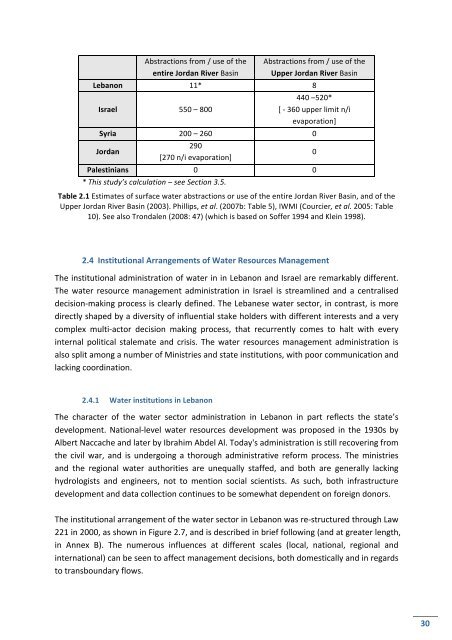Hydro-‐political Baseline of the Upper Jordan River - Ibrahim Abd El Al
Hydro-‐political Baseline of the Upper Jordan River - Ibrahim Abd El Al
Hydro-‐political Baseline of the Upper Jordan River - Ibrahim Abd El Al
You also want an ePaper? Increase the reach of your titles
YUMPU automatically turns print PDFs into web optimized ePapers that Google loves.
Abstractions from / use <strong>of</strong> <strong>the</strong><br />
entire <strong>Jordan</strong> <strong>River</strong> Basin<br />
Abstractions from / use <strong>of</strong> <strong>the</strong><br />
<strong>Upper</strong> <strong>Jordan</strong> <strong>River</strong> Basin<br />
Lebanon 11* 8<br />
Israel 550 – 800<br />
440 –520*<br />
[ -‐ 360 upper limit n/i<br />
evaporation]<br />
Syria 200 – 260 0<br />
<strong>Jordan</strong><br />
290<br />
[270 n/i evaporation]<br />
Palestinians 0 0<br />
* This study’s calculation – see Section 3.5.<br />
Table 2.1 Estimates <strong>of</strong> surface water abstractions or use <strong>of</strong> <strong>the</strong> entire <strong>Jordan</strong> <strong>River</strong> Basin, and <strong>of</strong> <strong>the</strong><br />
<strong>Upper</strong> <strong>Jordan</strong> <strong>River</strong> Basin (2003). Phillips, et al. (2007b: Table 5), IWMI (Courcier, et al. 2005: Table<br />
10). See also Trondalen (2008: 47) (which is based on S<strong>of</strong>fer 1994 and Klein 1998).<br />
2.4 Institutional Arrangements <strong>of</strong> Water Resources Management<br />
The institutional administration <strong>of</strong> water in in Lebanon and Israel are remarkably different.<br />
The water resource management administration in Israel is streamlined and a centralised<br />
decision-‐making process is clearly defined. The Lebanese water sector, in contrast, is more<br />
directly shaped by a diversity <strong>of</strong> influential stake holders with different interests and a very<br />
complex multi-‐actor decision making process, that recurrently comes to halt with every<br />
internal political stalemate and crisis. The water resources management administration is<br />
also split among a number <strong>of</strong> Ministries and state institutions, with poor communication and<br />
lacking coordination.<br />
2.4.1 Water institutions in Lebanon<br />
The character <strong>of</strong> <strong>the</strong> water sector administration in Lebanon in part reflects <strong>the</strong> state’s<br />
development. National-‐level water resources development was proposed in <strong>the</strong> 1930s by<br />
<strong>Al</strong>bert Naccache and later by <strong>Ibrahim</strong> <strong>Abd</strong>el <strong>Al</strong>. Today's administration is still recovering from<br />
<strong>the</strong> civil war, and is undergoing a thorough administrative reform process. The ministries<br />
and <strong>the</strong> regional water authorities are unequally staffed, and both are generally lacking<br />
hydrologists and engineers, not to mention social scientists. As such, both infrastructure<br />
development and data collection continues to be somewhat dependent on foreign donors.<br />
The institutional arrangement <strong>of</strong> <strong>the</strong> water sector in Lebanon was re-‐structured through Law<br />
221 in 2000, as shown in Figure 2.7, and is described in brief following (and at greater length,<br />
in Annex B). The numerous influences at different scales (local, national, regional and<br />
international) can be seen to affect management decisions, both domestically and in regards<br />
to transboundary flows.<br />
0<br />
30


